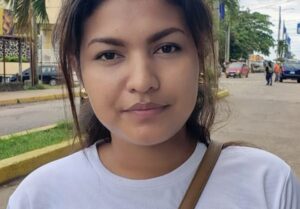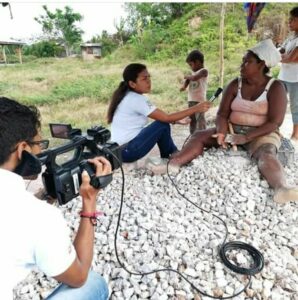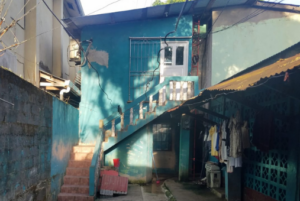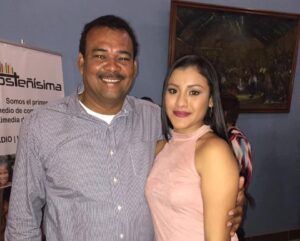*This post has been updated
On the morning of Sept. 14, the daughters of journalist Kalua Salazar were playing in the yard when they saw about 20 armed police arrive in a truck, get out of the vehicle and occupy the front of the house. The girls ran inside, startled, and asked Kalua, "Mommy, are they going to take you away?"
The 26-year-old Nicaraguan journalist was not detained, but the scene was repeated for several days in a routine of intimidation, Salazar told the LatAm Journalism Review. “I have three girls, one is 10-years-old, another 4 and one 2-years-old. [When the troops arrive] they are scared to death and they go inside the house. It's a pretty tough situation for them. The middle child always wakes up at night with fear. My mother's blood pressure increased and I had to take her to the hospital.”
Salazar is editor-in-chief and reporter for La Costeñísima radio in Bluefields, in the autonomous region of the South Caribbean Coast, in Nicaragua. The station's staff, made up of ten young journalists, are struggling to do their jobs in the face of power cuts, harassment, police intimidation and death threats. For doing critical journalism, with allegations of corruption and human rights violations in the country, La Costeñísima has suffered attacks on several fronts. The station is an example of how the independent press tries to survive in the country in the face of persecution by President Daniel Ortega's authoritarian regime.

Journalist Kalua Salazar. Photo: La Costeñísima
The most recent assault on the radio station was a criminal suit, in which Salazar was convicted of calumnia (slander). The journalist was sued for a report denouncing an alleged corruption case in the prefecture of El Rama, a town about an hour from Bluefields. The sentence, which was announced on Sept. 29, is a fine of 7,684.58 cordobas (about US$ 220), equivalent to a month and a half of Salazar's salary.
The conviction comes at a time when journalists are struggling to keep the radio station afloat, following the loss of its director and founder, Sergio León Corea, who died of COVID-19 in June. At the same time, the outlet suffers the effects of the economic recession, now worsened by the pandemic, but which has been going on since April 2018 when the country was shaken by a political crisis.
That year, demonstrations against Ortega's government were severely repressed by police forces, leaving at least 300 dead. In a report, the UN identified extrajudicial executions, forced disappearances, arbitrary detentions and torture by State and paramilitary agents. Since then, according to the organization, more than 100,000 people have applied for political asylum, including dozens of journalists.
After April 2018, the Nicaraguan regime and supporters of the governing party, the Sandinista National Liberation Front, turned against the press, with the arrest of journalists, retention of newsprint and occupation of newsrooms, such as Confidencial, 100% Noticias and the seizure of Nicavisión Channel 12's assets. According to a report by the organization Article 19 from December 2019, Nicaragua is one of the countries worldwide that saw the biggest drops in terms of freedom of expression in recent years.
When commenting on the risks of the profession, Salazar remembered her colleague, journalist Ángel Gahona, who was murdered in Bluefields while covering protests in 2018. "Here, when people start threatening you with death, you need to worry,” said the journalist, who receives constant messages on social media. On the radio’s social media profiles, publications are frequent: "You have to kill them all," "You have to burn them alive."

La Costeñísima radio team; Sergio León, who died of COVID-19, is in the yellow shirt. Courtesy photo.
The presence of the police at the doors of journalists' houses or in front of the radio station, in addition to the judicial process, has an emotional cost for Salazar. Sometimes she needs to take medicine to sleep, and a simple dinner out with her family has become impossible.
“We don't go out at all. I don't have the normal social life of a 26-year-old. Because if one goes out and is in a recreational place, they take photos of the family and I don't want them to take photos of my daughters,” she said.
For safety's sake, Salazar does no more than necessary: she goes from her home to work, from work to university, and returns. She is a student at the business school, because there was no journalism course in the region. “I leave college late at night and I'm very scared,” she said.
The judicial process was also exhausting, Salazar said. Before leaving for the hearing, she told her husband and mother to take care of their daughters in case she was arrested. According to Salazar, although there is no penalty of detention for the crime of calumnia, there is no confidence that the authorities will comply with the law. "Legally or illegally they can do this," she told LJR, days before the trial, which lasted five hours and took place behind closed doors.
After leaving, Salazar said over the phone that there was a crowd at the door of the court complex, shouting insults at her and asking for her arrest. “At the exit the policemen were taking photos and videos of me. And we could observe that many Ortega fanatics from El Rama had come, with their government shirts, they even rented a private bus to bring people, with food, all that,” she said.
On the other hand, she was moved by the presence of dozens of people who came to show solidarity. Salazar said many listeners who were there promised to help raise funds for the fine. And she feels a lot of pain to know that the injustice against the radio station also involves the population, which is already very impoverished.
“We know that many people here are not working and I would not want to take that money from that person, perhaps that’s for their children's food. That's what takes a toll on me emotionally. That is so unfair, that the population wants to contribute, but I know how poverty is here, I work hand-in-hand with all those people.”

Kalua Salazar, reporting on extreme poverty in Nicaragua. Courtesy photo.
The journalist also says that she was blackmailed to reveal her sources, which, according to her, would have made the case go away. If she did not provide the name of the source, "they would take it to the last instance.” “I told them: I gave my word when I did this anonymous interview. I'm going to die with my boots on."
Kalua Salazar started working at the radio station in 2013, helping the director, Sergio León, with special reports on extreme poverty, human rights violations and violence against women. With so many attacks, she says she never thought of leaving the profession, despite her mother's recommendations. “I tell my mother: there are two things in life that one should not allow: for dictators in power to manipulate their life and for fear to take over, because if you leave it, you are no longer a person with the use of reason," she remembered with a firm voice.
After the trial, Salazar went straight to the street to report on police violence. She said that many people depend on her and that, therefore, she could not "let herself fall.” “The worst thing I can do is go home to cry and lock myself up because that's what they want. So I, like every rebel, do the opposite,” she wrote, ending the message on WhatsApp with a happy face emoji.
People fear being reported for listening to the radio
The attacks on La Costeñísima are varied and are aimed at different targets, so much so that many of its journalists have already received precautionary measures from the Inter-American Commission on Human Rights (IACHR) because of the risk to their lives.
Salazar says that many people are afraid to listen to La Costeñísima in their own homes and use headphones to avoid problems. “They cannot listen to the radio because the neighbors can notify the Sandinista committee of the neighborhood, they signal that person as an opponent and make life impossible for him,” she explained.
Recently, the media outlet also faced power cuts, which usually occur during newscast time, about three times a week, Paula Smith, 32, general manager of La Costeñísima, told LJR.
She describes that, in addition to the presence of the police, who are in front of the radio station on a weekly basis, there are always two people on a motorcycle, "from Monday to Monday." "That is daily, they are recognized by their shoes and we already know that they are civil policemen." For security, the radio station started to close earlier, at 7 p.m.: journalists leave in groups and are taken home by car.
Smith says that since 2018, the radio's economic situation has deteriorated. The outlet, which today has a website and a television channel, survives from advertisements, but the economic and political crisis has drastically reduced advertising. For that reason, La Costeñísima began to put off paying its journalists for two or three months.

Celebration at La Costeñísima; Sergio León appears in the background in a striped shirt. Courtesy photo
“It is not something that is in the hands of the radio management team, Nicaragua is going through an economic recession,” Salazar said. She reinforces that, in this context, the fine imposed by the judiciary has a very big impact. Smith regrets that, with the delays, many journalists have left the radio, which, according to her, leads in the region in terms of audience. “There were 15 of us, before 2018, and there are only 10 of us left.” The station was also kept afloat thanks to the emergency support of some philanthropic organizations, such as Fundación Violeta Barrios de Chamorro.
Kimberly León, 23, who took over the radio station after her father's death, told LJR that the station was doing well before 2018: “This year was a radical change.” She adds that the government's crackdown contributed to stifling finances because advertisers were pressured to send their business to other radio stations.
“It is not easy, because all radio stations are partisan, and we compete against them. [...] Some people said it clearly, that someone from the government ordered them to cut advertising because they could not be with us and they had to always be with their party,” she explained.
The director recognizes the patience and understanding of employees who are owed wages. And she says that the team has worked together for many years. “We already consider ourselves family. The workers are patient with us, they wait for us, but we worry because we know that some are the only source of income for their home, that is why we are always looking for income everywhere” she said.
Radio at grandma's house, with mango tree and a dog named Toffi
The familial environment of the radio station is not just a metaphor for team unity. Today La Costeñísima is located in the back of Kimberly's grandmother's house. Her father, the founder, built a small blue building in his mother's courtyard to house the radio. Before, the media outlet used to occupy a house, on the same land, facing the street. But, for safety and after graffiti was painted on the walls of the station, Sergio decided to transfer the headquarters to the back.

The old headquarters of Costeñísima, which was painted with insults against the radio station. Courtesy photo.
So, to get to La Costeñísima, journalists need to pass by Mrs. León's house and say hello: "Good morning, Miss Janeth, how are you?" Only then do they cross the courtyard, which, although simple, houses a generous mango tree and Toffi, Mrs. León's dog and a kind of radio mascot.
“It is a small building, we are working as if it were all hand-in-hand, it is a friendly and happy environment. We have time to laugh, cry, chat and work,” Kimberly said.
La Costeñísima was founded by her father in 2001, after an invitation from a friend and partner. But it was always Sergio who took charge of the radio station, and her father's journalistic work marked Kimberly's childhood. Sergio was followed by strangers on the street, suffered intimidation and prosecutions – in 2019, he and his family received precautionary measures from the IACHR.
Kimberly says the attacks worsened with the 2018 crisis in the country, but she remembers episodes of violence much earlier. "My father was very fond of reporting on drug trafficking, and since then we have been chased and watched."

The entrance of the current headquarters of Radio La Costeñísima in Bluefields, Nicarágua. Courtesy photo.
Once, at age 11, Kimberly was sleeping in her parents' bed when people broke into the house and tried to force her bedroom door open. Her father, who had a gun, fired into the air, and the invaders fled. “And when we left the room to see if they were thieves, [...] they had stolen absolutely nothing. The objective was either to kill us all or it was to kill him,” she remembered. After that, Sergio hired a guard, who for years protected the family home.
Kimberly started working at the radio station in 2014 and, in 2018, also became the target of intimidation. In 2019, Sergio assessed that it was too dangerous for her to remain in Nicaragua and proposed that she go to the United States. Kimberly insisted that her father go with her, but he refused to leave the radio station. “My dad said he was going to be here no matter what happened to him. He was afraid that they would do something against his family.”

Current headquarters of Radio La Costeñísima, at the back of Kimberly's grandmother's house. Courtesy photo.
Kimberly returned from the U.S. after four months and stayed away from the radio station for about a year, until she couldn't take it anymore. “I didn't want to be at home doing nothing. I really like what I do and I don't see myself working anywhere other than in La Costeñísima.”
The journalist does not think about quitting the profession, even though it has a very high personal cost. Kimberly no longer goes out with friends, because she doesn't want to put anyone in danger or involve them in her situation. “Once the police told a friend that they had seen him with me and that he should cut off this friendship, because it could just bring him trouble. So I decided to walk away.” Kimberly doesn't feel safe talking to other people, because she doesn't know who she can trust. Her routine comes down to going to work and university, where she studies public accounting and finance.
"That has marked us, because we were free kids and now we are not. And most of the radio workers are super young boys and girls. [...] We know that we are going to work, but we do not know if we are going to return to our homes. We work with that fear inside," she said.
As security measures, Kimberly usually changes her car, means of transport, routes and schedules whenever possible. She also warns her mother, with whom she lives, whenever she leaves somewhere. Kimberly knows, however, that all of this has a limited effect. “They know my car and if they decide to stop me, they will.”

Kimberly and her father, Sergio León. Courtesy photo.
After her father's death, the attacks worsened, and journalists of the radio station feel more vulnerable. Sergio León was "an institution," they said, and the fact that he was a well-known journalist brought security and support to La Costenísima. Sergio was also the most experienced, a kind of moral compass for the team, which was very shaken by the loss.
“My dad already had his brand, nobody could touch him even if they wanted. And now he is gone, and none of us is Sergio León. So it's more dangerous,” Kimberly said. It has not been easy for her to take her father's place, in a time of mourning, fear and instability. In this process, the support of the team has been essential, she says. “It is an extremely great responsibility. I am 23-years-old, he had 50 years of hard work and study. I am in the process of adaptation and learning."
Kimberly doesn't want to see her father's work die with him, and it helps her to continue. “He loves this radio station, she said, emphasizing each syllable in the word “loved.” “This motivates me to continue fighting. I want to say that La Costeñísima is going to continue standing, it is going to continue opening its microphones to the entire coastal population, we are going to continue working as long as we can, as long as they allow us, because we know that, with this situation that we are experiencing in the country, anything could happen.”
This story was originally written in Portuguese and was translated by Teresa Mioli.
*The post was updated to clarify that the assets of Channel 12 were seized.